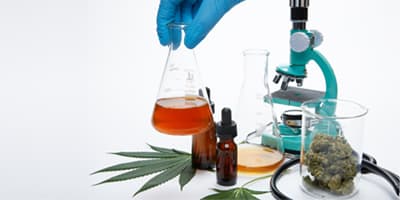About 50 million Americans suffer from autoimmune diseases that cause abnormal over-activation, or under-activation, of the immune system.
In cases of over-activation, the immune system produces antibodies in response to an unknown trigger that attacks the body's own tissues and organs. This can include the heart, brain, muscles, digestive tract, skin, eyes, joints, nerves, and lungs. In cases of under-activation, the immune system experiences difficulty in fighting off infections.
Some of the most common autoimmune diseases include psoriasis, which affects the skin; Crohn's disease, which affects the digestive system; and multiple sclerosis, which affects the brain, spinal cord, and optic nerves.

Experimentation with cannabis has provided relief for some individuals living with autoimmune illness: for example, people living with psoriasis report that cannabidiol (CBD) oil eases their pain and inflammation, while a survey of fibromyalgia sufferers in Israel revealed that cannabis consumption significantly relieves their pain and improves their sleep quality.
While there are promising reports of the therapeutic benefits of cannabis as a treatment for diverse autoimmune disorders, more large-scale clinical research in humans is needed to understand better how cannabinoids affect autoimmunity. Changing laws concerning the use of medical cannabis may see greater numbers of studies, including clinical trials on humans, in the near future.
What are autoimmune diseases?
There are more than 100 diseases categorized as autoimmune conditions, with some of the more-often-diagnosed conditions including psoriasis, rheumatoid arthritis, lupus, irritable bowel syndrome, and Crohn's disease.

Many autoimmune conditions share non-specific symptoms such as fatigue, nausea, weight loss, and low-grade fevers, sometimes rendering them difficult to distinguish from one another. One trait nearly all autoimmune diseases share, however, is inflammation.
Cannabis as Therapy
Conventional medicine has mainly responded to autoimmune diseases with drugs that aim to suppress the immune system. Cannabis, however, offers an alternative to immunosuppressive medications.
“Cannabis is an immunomodulator, meaning it helps to regulate and influence functions of the immune system,” explained Dr. James Polston, chief scientific officer at medicinal cannabis company Helius Therapeutics. “One of the primary mechanisms by which cannabinoids suppress the immune system is by decreasing inflammation.”

According to Sarah Russo, an herbal medicine educator, cannabis therapy offers a holistic response to complex autoimmune disorders, particularly when paired with dietary changes. “Cannabis can provide a holistic approach to treating (autoimmune) conditions, to bring the body into homeostasis and decrease the stress response,” she said.
How Could Cannabis Help?
Cannabis contains cannabinoids, which bind with receptors in the human endocannabinoid system (ECS) that extends throughout the body. “There are many cannabinoid receptors on immune cells, in joint tissue, the nervous system, brain, cartilage, and in the digestive tract,” explained Polston. “In fact, cannabinoid receptors are now known to be present in every system in the body where scientists have looked.”
According to Polston, the two cannabinoids that appear most beneficial for treating the inflammation associated with autoimmune diseases are CBD and THC. CBD has potent immunosuppressive and anti-inflammatory qualities. THC is also immunosuppressive, but only at very high doses. At low doses, it can offer benefits as an analgesic and anti-inflammatory treatment, he said.

Sarah Russo also notes that other cannabis compounds, namely terpenes, may also support the treatment of autoimmune disease. Beta-caryophyllene can decrease inflammation by stimulating the CB2 receptor, and myrcene also boasts anti-inflammatory qualities.
Insights into cannabis for autoimmune diseases
Research exploring the potential of cannabis as an autoimmune therapy is emerging. Some compelling findings thus far include:
Autoimmune hepatitis
Preclinical data from the University of South Carolina, published in 2011 in PLOS ONE, shows that CBD can suppress inflammation in mice with hepatitis, thereby reducing damage to the liver.
Psoriasis
An in vitro study of human skin cells published in 2006 in the Journal of Dermatological Science found that THC, CBD, cannabinol (CBN), and cannabigerol (CBG) can all inhibit the proliferation of keratinocyte cells, depending on the concentration of the cannabinoids used. Keratinocytes are responsible for the painful inflammation and scaly buildup of skin cells experienced by psoriasis sufferers.
Fibromyalgia
Spanish researchers conducted several surveys of 56 patients, 28 of whom smoked or consumed cannabis regularly. The findings published in 2011 in PLOS ONE reported that the cannabis users experienced significantly reduced pain and stiffness 2 hours after cannabis consumption.

Cannabis users also noted increased drowsiness, improved sense of well-being, and had a considerably higher score in the mental health component of one survey compared to the non-users. The mental health survey specifically measured anxiety, depression and energy levels.
Crohn's disease
Published in 2011 in the Israel Medical Association Journal, a clinical eight-week study of 30 patients unresponsive to standard Crohn's disease treatment found that 21 patients experienced a significant decrease in symptoms after taking THC-rich cannabis. The researchers were able to demonstrate that within 8 weeks, Crohn's patients also experienced enhanced well-being with no serious side effects.
A 2019 study in the journal Digestive Diseases and Sciences builds upon these findings by demonstrating that Crohn's patients who use cannabis are less likely to experience serious complications (such as blood transfusions and abscesses), compared to patients who abstain from cannabis.
Multiple sclerosis
A January 2018 review of preclinical and clinical data published in the Elsevier journal Progress in Neurobiology reported that cannabinoids can reduce pain and spasticity symptoms in multiple sclerosis and other neurodegenerative diseases. The researchers noted that cannabinoids have not yet proven to be successful in halting neurodegeneration; possibly due to administration and dosage uncertainties.

According to the National Academies of Science, Engineering, and Medicine, some of the strongest evidence we currently have about the medical benefits of cannabis is specifically related to its ability to reduce spasticity for MS patients.
What Are the Side Effects?
While it's possible that studies in the future may reveal side effects, at present, few have been reported and there is still much to explore.
“Immunosuppressive drugs can cause side-effects that are particularly undesirable, such as a higher susceptibility to infection, nausea, vomiting, and diarrhea. If you are dealing with an autoimmune disorder such as Crohn's disease, these are unacceptable side-effects,” Polston said. “The single greatest strength of cannabis therapy in comparison to these Western pharmaceutical therapies is the lack of (known) side-effects.”

For Sarah Russo, the power of cannabis as an AI therapy is that it works in harmony with the body, rather than against it. “Cannabis is completely different from traditional therapies, which act to suppress the immune system completely or turn it off. Our immune system exists for a reason. There is so much we still don't know about autoimmune illnesses, so holistic treatments like a clean diet and cannabinoid therapies represent a superior option.”
Polston notes that while it is critical to be mindful that cannabinoids can be biphasic, meaning that low and high doses can produce opposite effects, there is little chance of inhibiting inflammation too much. “Although we should be mindful of potentially aggravating autoimmune disorders with the biphasic effects of cannabinoids, it is not particularly distressing. This is especially true since we are primarily using (non-intoxicating) compounds such as CBD for autoimmune treatment.”




